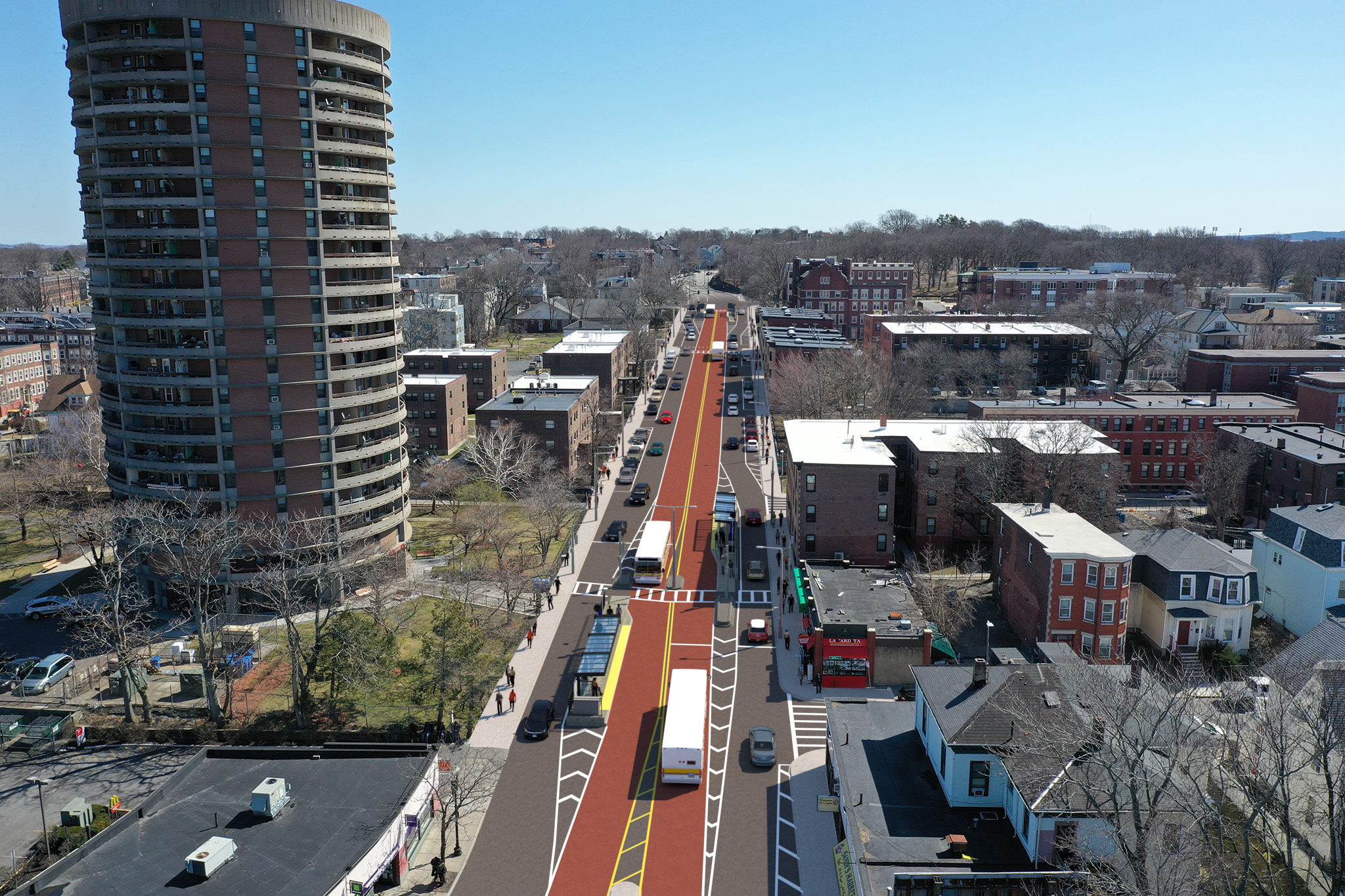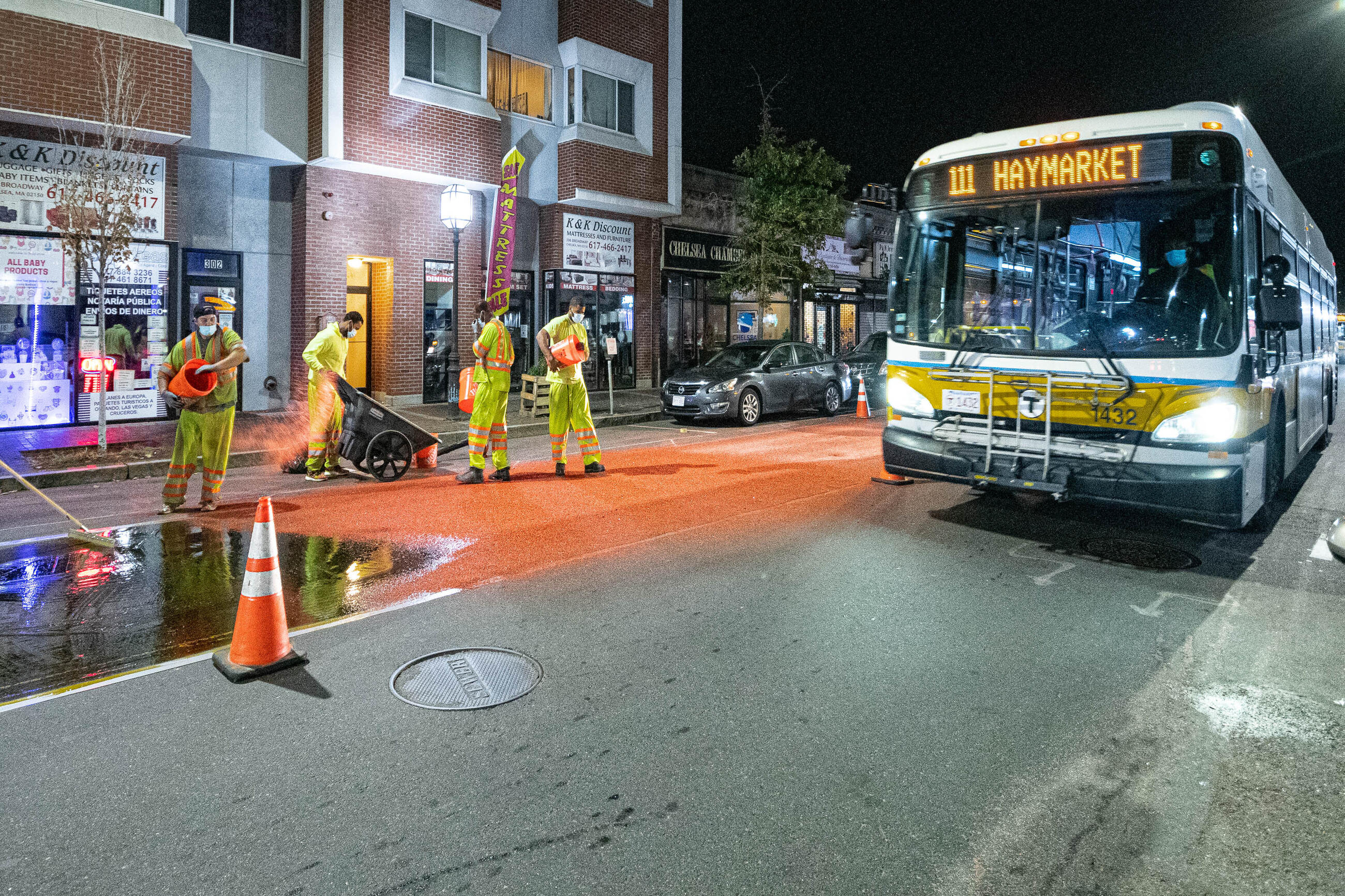MBTA Control Board Commits to Funding The Transit Priority Group as part of the FY22 Budget
Posted on April 27, 2021
With steadfast support from the Barr Foundation, the MBTA has worked closely with MassDOT and municipal partners to deliver over 13 miles of bus lanes and activate transit signal priority at 64 locations in six cities.
The FY22 budget, approved yesterday by the MBTA’s Fiscal and Management Control Board, includes a commitment to fully fund the T’s Transit Priority Group, a special unit dedicated to delivering bus lanes, transit signal priority (TSP), and collaborative planning programs with service-area municipalities. The four-person team has dramatically accelerated the MBTA’s planning and project delivery capacity for bus priority projects, which are proven to make transit faster and more reliable.
Since its creation in 2019, the MBTA Transit Priority Group has been funded with generous grant support from the Barr Foundation as a part of their philanthropic commitment to addressing climate change and advancing equitable mobility in Metro Boston.
“In the last few years, the MBTA’s bus priority network has gone from a couple streets along the Silver Line to a robust web of corridors spanning ten cities and towns across our service area. These targeted improvements, which are aimed at making bus service more reliable on some of the region’s most congested roadways, are a key component of the MBTA’s Better Bus Project, a broad-ranging, multi-year initiative aimed at transforming our bus system,” said MBTA General Manager Steve Poftak. “The MBTA would not have been able to make these advances without the steadfast commitment and partnership of the Barr Foundation.”

Since the Transit Priority Group’s launch in 2019, 13.6 miles of bus lanes have been constructed on Metro Boston roadways, bringing the total region-wide network to nearly 20 miles. These reliability benefits have had a far-reaching impact. While 3% of passenger miles travelled are in bus lanes, reliability benefits extend to 41% of passenger miles travelled systemwide.
“A decade ago, rapid, reliable, high-quality bus service was something few in Metro Boston had even heard of or believed was possible here. Now, it’s becoming a reality with potential to improve the transit experience for thousands of bus riders every day,” said Senior Program Officer at the Barr Foundation Lisa Jacobson. “The Barr Foundation was pleased to help launch the Transit Priority Group at the MBTA to bring world-leading ideas to help solve congestion, access, and climate challenges in our communities.”

Notable projects spearheaded by the Transit Priority Group since 2019 include:
- A first-of-its-kind transit facility in Metro Boston: a center-running bus lane project currently under construction on Columbus Avenue in Roxbury and Jamaica Plain to dramatically improve bus service reliability, accessibility, and rider comfort.
- An unprecedented regional joint procurement effort led in partnership with MAPC to significantly reduce construction costs for quick-build transit and active transportation projects for 13 metropolitan area municipalities, which the MBTA estimates will save taxpayers a projected $2 million over the course of this year.
- In response to COVID-19 service needs leading to the implementation of the MBTA’s Rapid Response Bus Lanes Program, a partnership with the cities of Boston, Somerville, Everett, and Chelsea to build up to 14 new bus lane miles on critical transit corridors.
- Working with MassDOT and six different municipalities to deliver 10 Shared Streets and Spaces and Shared Winter Streets and Spaces projects.
- Expanding bus priority projects to several new municipalities, including Chelsea, Malden, and Lynn.
- Continuing previously initiated projects such as implementing TSP on the Green Line in Brookline and Boston.
In the next several months, the Transit Priority Group is working closely with four municipalities to deliver more than four miles of bus lanes, standardize the preferred design approaches through a bus speed and reliability toolkit, and kick off a regional collaboration to define the next generation of TSP for Metro Boston.
More Information
Media Contact Information
For all queries and comments, please contact:
Recent News on the T
April 22, 2024
April 18, 2024
April 18, 2024
April 18, 2024